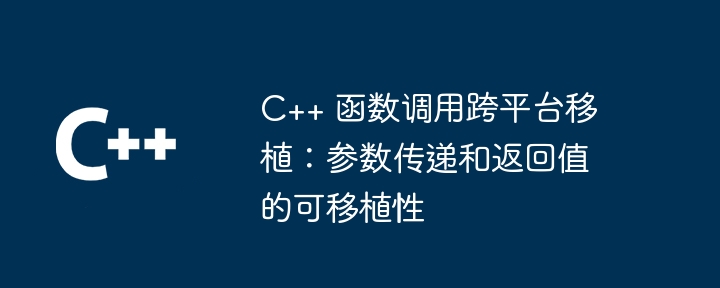Home >Backend Development >C++ >C++ function call cross-platform portability: parameter passing and return value portability
C++ function call cross-platform portability: parameter passing and return value portability
- WBOYWBOYWBOYWBOYWBOYWBOYWBOYWBOYWBOYWBOYWBOYWBOYWBOriginal
- 2024-04-30 10:03:01593browse
In cross-platform C function calls, the default mechanism for parameter passing is different. You need to use const to force passing by value or reference to force passing by reference. Return value conventions vary from platform to platform, and typedefs can be used to define platform-independent types or encapsulate return values. The practical case demonstrates cross-platform function calls using typedef to define data types for platform differences.

C cross-platform porting of function calls: portability of parameter passing and return values
Writing cross-platform code in C When calling a function, you need to consider the portability of parameter passing and return values. Different platforms have different conventions for these aspects, which can cause problems. This article discusses these portability issues and provides some solutions for overcoming them.
Parameter passing
C uses two parameter passing mechanisms: pass by value and pass by reference. Passing by value copies the parameter value into the called function, while passing by reference passes the reference of the parameter into the called function.
Different platforms have different conventions on the default parameter passing mechanism. For example, on Windows, pass by value is by default, while on Linux, pass by reference is by default. This results in code that behaves inconsistently across different platforms.
Workaround: You can use the const keyword to force pass by value, or use the reference (&) to force pass by reference. Here is an example of using const and references:
// 按值传递
void func(const int value) {...}
// 按引用传递
void func2(int& value) {...}Return value
Function in C can return a value of any type, including primitive types , structures and classes. Similar to parameter passing, different platforms have different conventions for return values.
For example, on Windows, the value returned by a function is stored in EAX, and on Linux, it is stored in EAX and EDX. This can lead to inconsistent behavior of code on different platforms.
Solution: For simple types, you can use typedef to define platform-independent types. For complex types, you can encapsulate the return value by using a structure or class to ensure cross-platform portability. The following is an example of using structures and classes:
// 使用结构体
struct Point {
int x;
int y;
};
Point func() {...}
// 使用类
class MyClass {
public:
int value;
};
MyClass func() {...}Practical case
The following is a practical case of cross-platform function calling:
#ifdef _WIN32
typedef int64_t int64; // Windows 平台使用 int64_t 表示 64 位整型
#else
typedef long long int int64; // Linux 平台使用 long long 表示 64 位整型
#endif
int64 sum(int64 a, int64 b) {
return a + b;
}
int main() {
int64 result = sum(1, 2);
return 0;
}This The code defines a function sum(), which calculates the sum of two 64-bit integers. On the Windows platform, int64 is defined as int64_t using typedef, while on the Linux platform, it is defined as long long. In this way, Function sum() can be compiled and run on both platforms without modifying the code.
The above is the detailed content of C++ function call cross-platform portability: parameter passing and return value portability. For more information, please follow other related articles on the PHP Chinese website!
Related articles
See more- Advanced front-end basics (6): Observe function call stacks, scope chains and closures in Chrome developer tools
- About how to use exec, system and other functions to call system commands in PHP
- How to change dev c++ to Chinese
- How to change ip address in linux
- The flexibility of function calls in PHP8 allows extremely complex codes to be easily implemented

